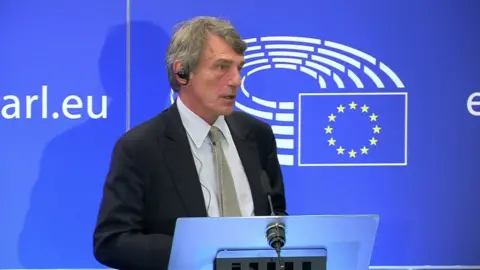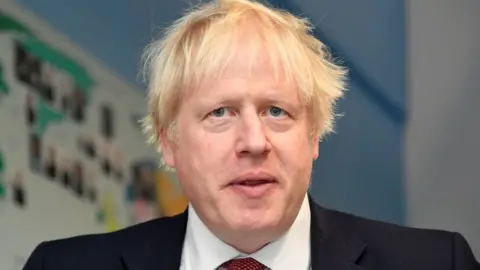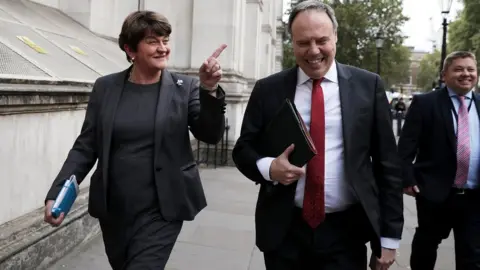Brexit: Top MEP 'willing to revisit NI-only backstop'
 BBC
BBCThe head of the European Parliament has said he is willing to revisit the proposal of a Northern Ireland-only backstop to break the Brexit deadlock.
The President of the European Parliament, David Sassoli, said there would be no agreement without a backstop in some form.
But on Wednesday, Prime Minister Boris Johnson ruled out an NI-only backstop.
The UK is due to leave the EU on 31 October without a deal unless both sides can reach a compromise.
Mr Sassoli was speaking at a press conference after talks between the European Parliament's political group leaders and EU chief Brexit negotiator Michel Barnier.
The parliament is not directly negotiating with the UK, but will vote on any final Brexit deal.
UK officials have been in Brussels for meetings this week with Mr Barnier's team.
 Toby Melville/pa
Toby Melville/paMr Sassoli said "the signals we're getting are not indicating any [UK] initiative that would reopen the negotiations, and we're not happy about that".
He outlined points to be included in a European Parliament resolution on Brexit, to be voted on by MEPs next week.
What is the backstop?
It has proved to be the most contentious part of the Brexit negotiations.
It is the insurance policy to avoid a hard border between Northern Ireland and the Republic of Ireland after Brexit, unless and until another solution is found.
Westminster MPs rejected the backstop and withdrawal agreement negotiated by ex-PM Theresa May, which would have kept all of the UK in a "temporary customs territory" with the EU and would have seen Northern Ireland also continuing to follow other EU rules.
The Democratic Unionists (DUP) had opposed it, saying it would create a border down the Irish Sea and risk the future of the union.
 Dan Kitwood/getty images
Dan Kitwood/getty imagesThere had been speculation in recent days that the UK was considering returning to the idea of a Northern Ireland-only backstop, which had originally been proposed by the EU in the early stages of the negotiations in 2017.
The DUP had insisted it and No 10 would not back such a proposal as it would not have "unionist consent".
After talks with Boris Johnson on Tuesday, the DUP said it was exploring all-island "arrangements" on food standards and animal safety as part of a solution to replace the backstop.
Mr Sassoli said the European Parliament's draft resolution would say "we are willing to go back to the original EU proposal" of an NI-only backstop.
"You can't have an agreement without the backstop, it couldn't really be any clearer," he added.
The resolution will also express MEPs' willingness to turn the political declaration on future EU-UK ties into "a legally binding document".
'Firmness and clarity'
The next EU summit is due to take place on 17-18 October, just several weeks before the UK is due to leave the EU on 31 October.
Mr Johnson has insisted he will not seek another extension to the deadline, and said the UK would be ready to leave with or without a deal.
He has said he hopes a deal can be reached and that he has an "abundance of proposals" to replace the backstop - but has not detailed what they might be.
The Irish government has said it would also be willing to look at a "Northern Ireland-specific solution".
Mr Sassoli said the EU had "reached a moment where we need to express our positions with firmness and clarity".
The parliament is willing to extend the deadline beyond 31 October "provided it's something done for overriding reasons", Mr Sassoli said, such as to avoid no deal or to hold a general election.
The resolution will say that if the UK exits without a deal "it will be entirely the responsibility of the UK".
What was the NI-only backstop?
It would have kept Northern Ireland in the EU's customs union, which would have meant applying EU tariffs for goods entering NI from outside the EU customs union - including Great Britain.
It would also have applied EU single market rules for goods and animal products in Northern Ireland.
This would have got rid of the need for checks at the Irish border, but would have led to checks on goods passing between Northern Ireland and Great Britain.
It was criticised by the DUP and other unionist parties for "creating a border in the Irish Sea" and posing a risk to the union.
In February 2018, Theresa May said no prime minister could back such a proposal.
